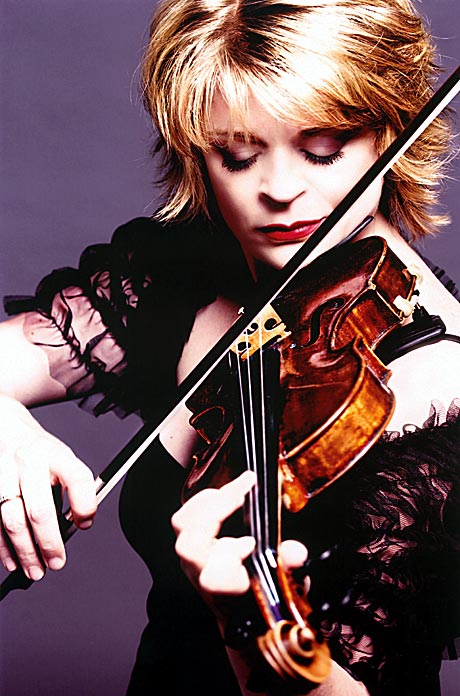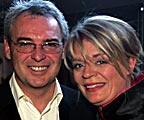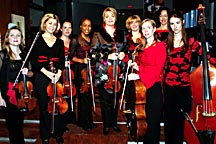Violin + Passion = Success by Réjean Beaucage
/ November 29, 2004
Version française...

Angèle Dubeau knows you have to work hard
to succeed in the music world. Proof of this is her CD list (over twenty, all
with Analekta), some of which are Canadian bestsellers. In mid-October she
launched her most recent recording, Passion, just after returning from a short tour in
China to promote her previous CD. The day after the release
of Passion, she left again to give concerts featuring its music in four
Canadian cities – Bathurst, New Richmond, Matane, and Kingston. Next stop on her
busy schedule is Japan, where Dubeau spent the month of November giving some
fifteen concerts to full houses and recording a new album with her chamber
ensemble to be released there on the Universal Records label.
Dubeau's preferred repertoire, whether performing
solo, with her string ensemble La Pietà, or with other partners, is not very
different from that of most great violinists. You'll find the great composers
but also the more obscure ones, with a few surprises thrown in. There are
Albéniz and Albinoni, but also Alexander Brott; Dubeau plays Bach and Bartók as
well, Boccherini and Claude Champagne, Shostakovich and Copland, de Falla and
Debussy; in her world, François Dompierre mixes with Fauré, Franck with
Glazunov, Jacques Hétu with Holst and Kabalevsky, Rachel Laurin with Jean-Marie
Leclair, and Liszt with André Mathieu. Mendelssohn, Mozart, Paganini, Piazzola,
Prokofiev, Respighi, Saint-Saëns, Schubert, Sibelius, Tartini, Tchaikovsky and
Vivaldi – they're all there. Asare David Bowie... and the Rolling Stones! While
these names may have attracted some, they have certainly repelled purists for
whom pop music is an acoustic version of hell. To what then, can we attribute
her phenomenal success?
We reached Angèle Dubeau at her home on what was,
for her, a rare day off. "A musician's raison d'être is her audience, "
she told us. "The hours of work that I put in are well recompensed. The support
I get both from concert audiences and people who buy my CDs gives me a real
adrenaline rush. It's hard to analyze success. What I can say is that I've been
at this for over twenty-five years, and that a large part of my public has
followed my development. I've been on various television programs for several
seasons, things like "Faites vos gammes" or "Angèle Dubeau et la fête de la
musique" which gave me exceptional exposure. Before television, people on the
street would say 'Good morning Mrs. Dubeau', but today, they'll say 'Hi Angèle'.
People whose homes I enter directly every week via television know me better,
naturally . . . although I play the same music. I've become more 'human' for
much of the public, and so has the music."
Making music accessible
 Being a TV presenter has allowed Dubeau's to
fulfill her desire to share the pleasure of music by making it more accessible.
She wants a greater number of people to become familiar with works too often
supposed to be reserved for music specialists. Being a TV presenter has allowed Dubeau's to
fulfill her desire to share the pleasure of music by making it more accessible.
She wants a greater number of people to become familiar with works too often
supposed to be reserved for music specialists.
"Even before founding La Pietà eight years ago, I
was thinking in terms of democratizing the so-called 'great' music, music which
exists for everyone. But I was also thinking of a particular repertoire that I
like and wanted to perform, even though it was perhaps a rather unusual one for
a classical musician. I thought that if I did it with the same seriousness that
lies behind my interpretations of the major classical repertoire, I'd have no
reason not to do a few fun things. Sometimes, however, the 'fun things' stick in
people's memory more than the rest. But if you look at the Passion CD,
for example, you'll find Chopin, Gershwin, Sarasate and Bizet, who aren't minor
composers. Someone might ask me why I've included Stephen Foster's Jeanie
with the Light Brown Hair. My answer would simply be that it's a piece I
love. It's also something that Jascha Heifetz often played in recital. But since
I've already done the Beatles' Yesterday, or other things by the Rolling
Stones, some people think I only do pop music. I think it's fantastic to be able
to revisit these alternative 'classics.' Of course, when I'm preparing a
concert, or a program for the Fête de la musique à Tremblant (of which
I'm the artistic director), I think of the audience, and I want them to feel
that they're getting their due. It's true that I occasionally give them
something more difficult, but it's presented in a way that shows the selections
at their best. I think this helps introduce part of the public to something
new."
The gypsy experience
The Passion CD also features George Enescu's
Rumanian Rhapsody No. 1. The work stirs memories for Dubeau, who lived in
Rumania for three years after winning the first prize at the Conservatoire de
musique de Montréal, and spending time at Juilliard in New York. "I went [to
Rumania] from 1981 to 1984 to study with Stefan Gheorghiu. It wasn't easy, as
this was under the Ceaucescu dictatorship, but it was very enriching from a
musical standpoint. This was primarily due to my teacher, but also because I was
able to listen to a lot of gypsy music. I know that when I got back I wasn't the
same violinist, because from listening to the gypsies, I'd learned to what
extent you can make a violin weep or speak. People couldn't express themselves
freely in words, but with a violin they said all they wanted to. . . It was
almost depressing! But it was very good training."
In September, Dubeau was busy with the ninth
edition of the Fête de la musique à Tremblant; in October, she went to
China, had a CD launch and performed several concerts in Canada; in November she
was in Japan. Is this a usual schedule for Angèle Dubeau?
"It's just like the schedule I had before becoming
a mother," she says. "Marie is twelve now. But before her arrival I was often
absent for eight months in a year. Today, with the string ensemble, we try not
to be away for more than two weeks, especially since La Pietà is made up
entirely of women, including several mothers! It was the first time the group
went to China, and also the first trip to Japan. Clearly, the twenty-four
recordings (seven with La Pietà) are visiting cards that attract invitations to
perform. The logistics all have to be worked out. For me it was the fourth
journey to China, and it was wonderful to be able to see the development since
1987 of a city like Shanghai, for example. Many Chinese know little about
Western music and they're keen to hear it. We were a big hit there."
Dubeau spent November travelling through Japan with
"Arthur," her violin (aka the Des Rosiers Stradivarius of 1733 that
belonged to Arthur Leblanc, and that she acquired in 1977). Accompanied by
pianist and composer Joe Hisaishi, La Pietà went from Sagamioono to Tokyo and
from Sapporo to Hiroshima performing an entire program of Hisaishi music. Over
the course of these fifteen concerts, the soloist and her ensemble performed in
front of over 25,000 people!
The first Passion concert is scheduled for
February 4th and 5th at Montreal's Monument National
theatre.
[Translated by Jane
Brierley]
Recipe For Success

Dubeau's success is all the more remarkable if we
consider the fact that CD sales of classical music, and of music in general, are
currently in a slump. Is her success based mainly on her chosen repertoire or on
its marketing? We put the question to Mario Labbé, founder and president of the
Analekta label.
"As far as classical music in Canada goes, a hit
meant selling 5,000 CDs," says Labbé. "Angèle Dubeau's releases, La Ronde des
berceuses, Berceuses et jeux interdits, Violons d'enfer,
and Violons du monde sold 50,000 or more. It's a fairly unique
phenomenon. In all, Angèle has sold over 400,000 CDs. We're looking at figures
comparable to pop recordings. Nobody [in the classical field] even comes close
to these numbers. With the exception of Angèle Dubeau, our best seller to date
is the recording with Alain Lefèvre and the Quebec Symphony Orchestra of André
Mathieu's Concerto de Québec, currently at 22,000 copies after
fifty-eight weeks. I saw it this morning in SoundScan [a list of
best-selling recording in Canada and the U.S.]. This is on a par with recordings
by André Rieu or Andrea Bocelli that, in the final analysis, have little to do
with classical music. However you can't say we're looking at crossover with
Angèle or Alain.
This success is due to a combination of marketing,
talent, and exposure. Marketing can only promote what Dubeau herself has
created. Dubeau's first CD in 1987 reached 6,000 in sales after a few months.
Her second, Adoration, recorded with Les Petits Chanteurs du Mont-Royal,
reached 15,000 in a short time. This was already exceptional. The only CD to
sell more at the time was one by the MSO featuring Ravel's Boléro. The
real source of Dubeau's success is the fact that she has cultivated her public
for the past twenty-five years, and that she's a born communicator. This other
talent opened the doors of TV broadcasting to her, which was no small advantage.
Finally, as far as Analekta is concerned, we were able to use these different
elements to create an appropriate marketing plan. However, this final phase
isn't necessarily a guarantee of success. We've often seen monumental flops in
the recording industry – sales of 5,000 CDs backed up by advertising campaigns
that cost hundreds of thousands of dollars. What Dubeau's public finds in her
work is quality, tout simplement."
Version française... |
|


